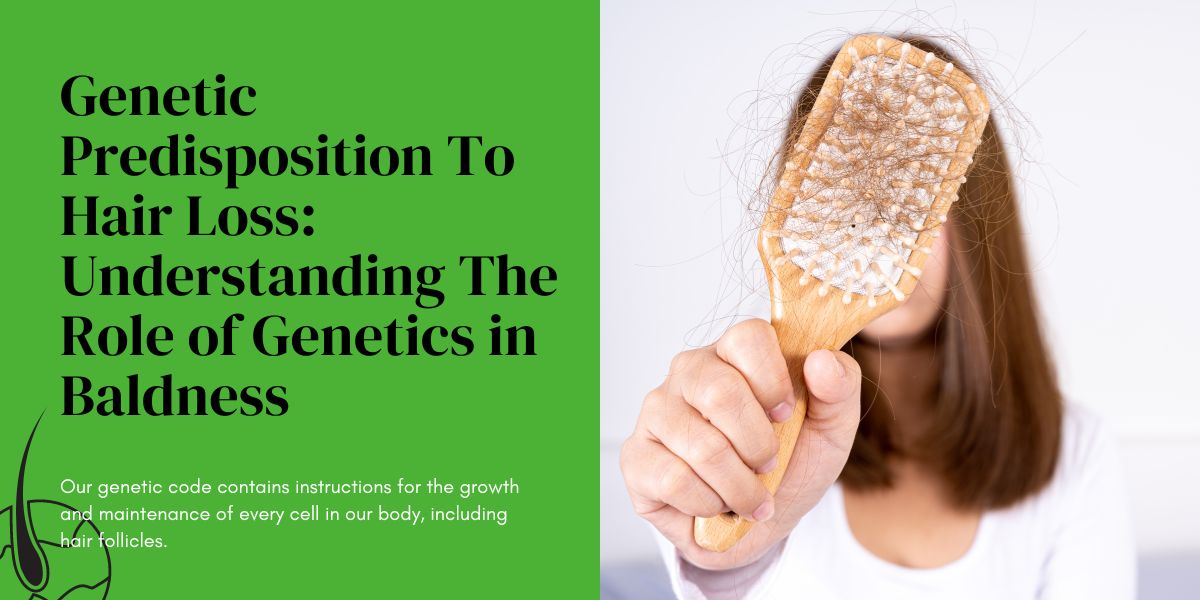Genetic Predisposition To Hair Loss: Understanding The Role of Genetics in Baldness
Decoding the Genetic Blueprint of Baldness: Is Your Hair Destiny Written in Your Genes?
Genetic Predisposition to Hair Loss
Hair loss is a prevalent condition that affects people of all ages and backgrounds. While it can be attributed to several factors, one crucial aspect that often plays a significant role is genetics. Understanding the genetic predisposition to hair loss is key to developing effective prevention and treatment strategies. In this comprehensive guide, we’ll delve into the intricate relationship between genetics and baldness, exploring the science behind it and offering insights for those seeking to better understand and manage this common condition.
Introduction: Unraveling the Genetic Tapestry of Hair Loss
Hair loss, medically known as alopecia, is a multifaceted issue with genetic predisposition being a major contributing factor. Before we dive into the specifics, let’s establish a foundational understanding of how our genes influence the health of our hair follicles and, consequently, the risk of baldness.
Understanding Genetic Predisposition: The Basics
Genes are the fundamental building blocks of our biological makeup, and they play a pivotal role in determining various traits, including the health and growth patterns of our hair. While environmental factors certainly contribute to hair loss, an individual’s genetic predisposition can significantly influence the likelihood and severity of baldness.
The Science Behind Genetic Predisposition to Hair Loss
Genes and Hair Growth: Unraveling the Code
Our genetic code contains instructions for the growth and maintenance of every cell in our body, including hair follicles. Specific genes regulate the cycles of hair growth, rest, and shedding. Understanding these genetic mechanisms is crucial for deciphering why some individuals experience excessive hair loss while others maintain a full head of hair throughout their lives.
Hormones and Genetics: A Complex Interplay
Hormones also play a crucial role in the development of baldness. Dihydrotestosterone (DHT), a derivative of testosterone, is implicated in the miniaturization of hair follicles in individuals genetically predisposed to hair loss. We’ll explore how this hormonal interplay affects the hair growth cycle and contributes to the progression of baldness.
Genetic Predisposition and Types of Hair Loss
Male Pattern Baldness: The Influence of X and Y Chromosomes
Male pattern baldness, also known as androgenetic alopecia, is the predominant kind of hair loss that affects men. It is strongly linked to genetic predisposition, with the inheritance of certain genes on both the X and Y chromosomes contributing to the development of this condition. We’ll explore the inheritance patterns and genetic markers associated with male pattern baldness.
Female Pattern Hair Loss: Navigating the Genetic Landscape
While less prevalent than in men, female pattern hair loss is also influenced by genetic factors. We’ll delve into the specific genes and hormonal dynamics that contribute to hair thinning and loss in women, providing insights for those seeking to understand and address this concern.
Managing Genetic Predisposition to Hair Loss
Early Detection and Intervention: A Proactive Approach
Understanding your genetic predisposition to hair loss allows for early detection and intervention. We’ll explore available genetic tests that can provide insights into your risk of baldness, empowering individuals to take proactive steps in managing and preventing hair loss.
Holistic Approaches: Lifestyle, Nutrition, and Genetics
While genetics play a significant role, lifestyle factors, including diet and stress levels, can impact the expression of genes related to hair health. We’ll discuss holistic approaches that combine genetic insights with lifestyle modifications to promote optimal hair growth and mitigate the effects of genetic predisposition.
Conclusion: Navigating the Genetic Landscape of Hair Loss
In conclusion, genetic predisposition to hair loss is a complex yet crucial aspect to consider when addressing the common concern of baldness. By understanding the science behind it, individuals can make informed decisions about prevention and treatment strategies. Embracing a holistic approach that combines genetic insights with lifestyle modifications empowers individuals to take control of their hair health and well-being.
societal level.





